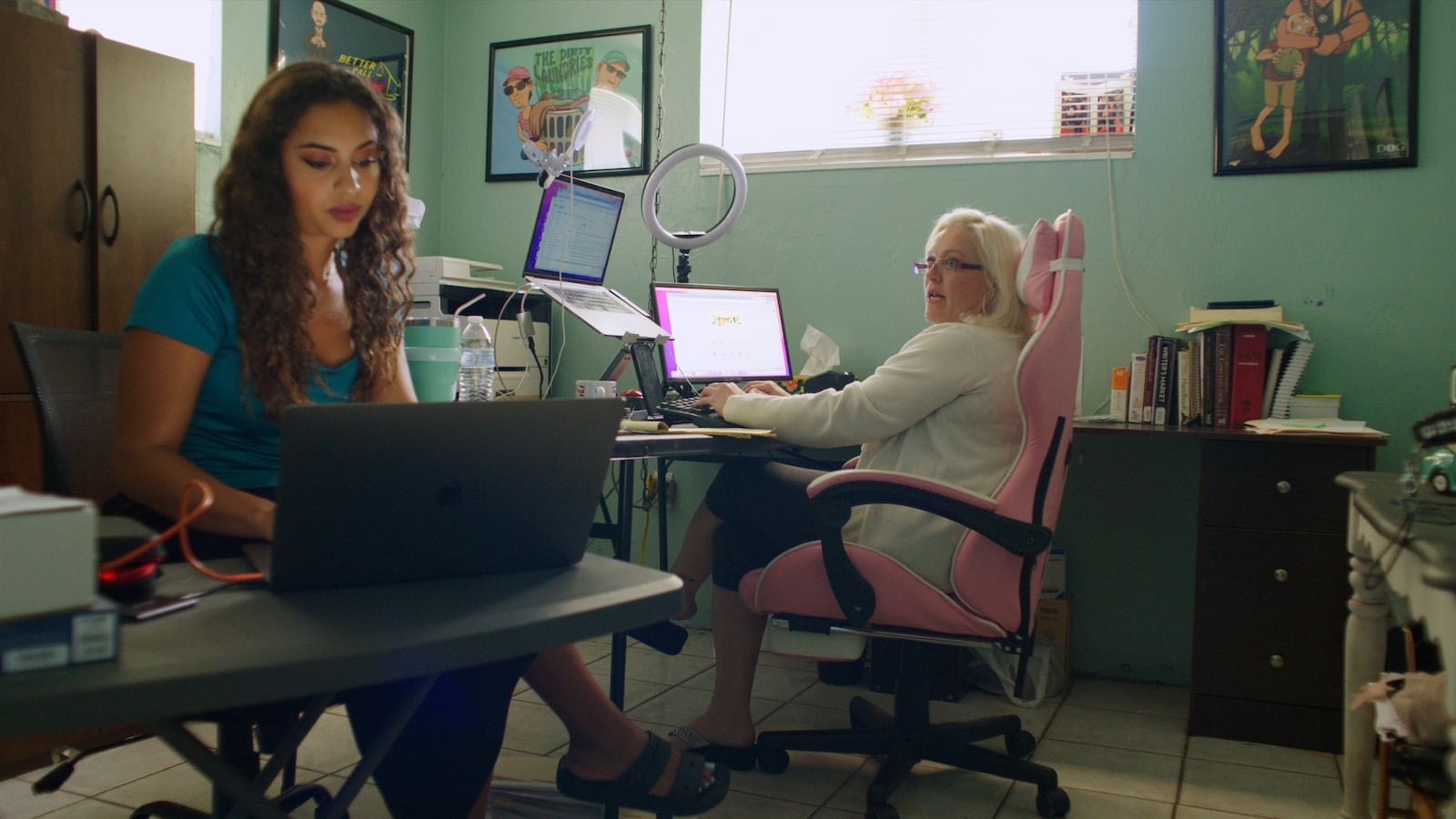Paramount+’s three-part docuseries #CyberSleuths: The Idaho Murders (Feb. 6) is a damning exposé—albeit not about the quadruple homicide that prosecutors allege was committed by Bryan Kohberger. Rather, it’s a scathing indictment of the amateur-hour detectives who exploit tragedies for monetized clicks, likes, follows, and subscribes on social media. Recounting this horrible tale through the lens of these self-serving men and women, it’s a censure of a morally suspect trend that, in this instance, has done nothing but line the pockets and stroke the egos of its practitioners.
As conveyed by this non-fiction effort, cybersleuths were immediately attracted to the murders of University of Idaho students Madison Mogen, Kaylee Goncalves, Ethan Chapin, and Xana Kernodle, who were slain in their home during the early morning hours of Nov. 13, 2022.
The appeal of this headline-making case wasn’t hard to discern. The foursome were good-looking all-American kids, and they’d seemingly been killed (viciously, with a knife) in their sleep, all while two additional roommates were in the house. Despite having been present (and thus probably privy to their friends’ screams), the survivors didn’t call 911 until approximately noon the next day. Given that police quickly exonerated the victims’ friends and significant others, there were no clear suspects, nor any obvious explanations for how this crime was executed or the motivation behind it.
In the immediate aftermath of this slaughter, Moscow, Idaho, police were less than forthcoming with information, so internet gumshoes like Olivia (1.2 million TikTok followers) and “Bullhorn” Betty (99.6k TikTok followers) seized the opportunity to fill the void via their own online channels, flooding the discourse with sensationalistic speculation. First, they pointed fingers at law enforcement for their lack of transparency, which supposedly meant something was amiss. Then they turned their attention to Kaylee’s boyfriend, who’d broken up with her shortly before her death (and whom she’d been trying to phone that fateful night). Later, there was a neighbor, Jeremy Reagan, who’d done some TV interviews, and who was deemed creepy and weird by internet commenters.
When those leads didn’t pan out, they looked in different corners of the story, picking at details in a vain effort to prove that there was a conspiracy afoot, a larger truth, that the “mainstream media” didn’t want you to know or was too incompetent to discover. They, conversely, deemed themselves independent and reliable voices of truth.
Except, of course, that they’re unqualified strangers who have no connection to the Idaho murders, no expertise in criminal investigation, and no access to anything more than likeminded online randos eager to get a few seconds in the social media spotlight. Many of these fake detectives describe their work and defend themselves in #CyberSleuths: The Idaho Murders, such as Jenna (772.9k TikTok followers), who remarks about the media, “We’re clickbait but you’re not? C’mon!” She additionally says, about questioning everything, “The fucking police did, so why can’t I?”
Suffice it to say, these are not serious questions, and they do not make Jenna come across as a serious person. And the revelation that she’s also a beauty and lifestyle influencer only underscores that impression. When it comes to not comprehending how journalism works, however, she’s not alone; for example, fellow cybersleuth Brat (26.6k TikTok followers) asks—in the wake of being totally duped by a troll posing as a witness—“How am I supposed to verify any of this?”
#CyberSleuths: The Idaho Murders is full of such pearls of non-wisdom, including from Olivia, who claims, “I have more freedom, where I can literally say whatever I want. Versus when you are working for a corporation, legally sometimes there are certain things the reporters can’t talk about.” In other words, she and those like her are just talking heads, and despite sometimes recording a video from the scene of a crime or outside a police department—or even convincing victims’ desperate relatives to sit down for an interview—they’re glorified “crime tourists.”
It will come as no shock to learn that these faux-Hercule Poirots were caught totally off-guard by law enforcement’s arrest of Kohberger (whom they’d never heard of), nor that the myriad posts depicted in this docuseries involve TikTokkers reacting to material made public by the police of authentic journalists. They’re not PIs; they’re personalities.
Equally unsurprising is that Olivia and Betty’s colleague JLR is a convicted fraudster and habitual con man, since every cybersleuth seen in #CyberSleuths: The Idaho Murders is quite blatantly using this real tragedy for personal profit. They’re also, as the docuseries intimates, muddying the waters in various ways, including by re-traumatizing those directly related to the victims, influencing public sentiment (thereby complicating the jury-selection process), and possibly providing evidence to—or being manipulated with fake clues by—the actual killer.
What emerges, then, is a portrait of cosplayers who justify their endeavors with disingenuous and/or moronic platitudes about how social media is the new normal (and it’s not going away!), about how resource-thin small-town police forces need and want their help (see, they even asked for the public to keep sending in tips!), and about how they’re merely satisfying people’s pre-existing hunger for updates, conjecture and theories.
The infatuation with true crime is nothing new, but #CyberSleuths: The Idaho Murders suggests that its recent explosive popularity has been a net societal negative, at least insofar as it’s created a culture of exploitation. There’s a serpent-devouring-its-tail quality to the docuseries, which addresses the downsides of cybersleuthing—and affords cybersleuths with plentiful chances to expose themselves as unprofessional—and yet nonetheless aims to attract viewers by platforming this subculture and its members. Critiquing with one hand and promoting with the other, it winds up caught in a tangle that it’s not deft enough to escape.
Worse, though, is that the proceedings spotlight these self-interested strivers in favor of focusing on the Idaho murders themselves. Anyone looking for a lucid explication of the facts, or insights into the four young people whose lives were stolen on Nov. 13, 2022, won’t find them in #CyberSleuths: The Idaho Murders. For that, I guess they’ll have to turn somewhere else—say, the legitimate media.








